9 dec 2016
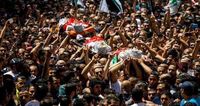
Israel security cabinet decided to hand over the bodies of 7 Palestinians accused of carrying out resistance operations against the Israeli forces over the few past months, Hebrew media reported on Friday.
The disagreements within the cabinet regarding the issue ended with the decision of withholding the bodies of those affiliated with Hamas Movement, Israel radio said.
The radio said in its website that the cabinet decided on Thursday evening to return the bodies of 7 Palestinians (whose families had presented petitions to get the bodies back) out of 10 who carried out resistance attacks in the past few months.
It said that the Israeli government informed the Supreme Court with its decision, saying that handing over the bodies will not take place unless the families agree on the conditions put by the Israeli army about the funerals so that they will not turn into "incitement rallies".
The Israeli cabinet affirmed that the remaining three bodies, which belong to "terrorists from Hamas", will not be returned.
Haaretz newspaper reported on Friday that disagreements arose in the meeting held last Wednesday between Avigdor Lieberman, Israeli war minster, and Major General Nitzan Alon, head of central command in the Israeli army, about returning the Palestinian bodies.
It was finally decided to return the bodies of the Palestinians of no organizational affiliation and those of any organizational affiliation other than Hamas, the paper added.
The number of the Palestinian martyrs withheld in the Israeli morgues reached 26 including 4 females. The Israeli authorities refused to hand them over to their families as a punishment for the resistance operations they allegedly carried out or tried to.
Israel announces it will return 7 bodies of slain Palestinians to their families for burial
The Israeli government on Friday announced that it would be releasing for burial seven out of 10 bodies of slain Palestinians currently being held by Israeli authorities, according to Israeli news website Haaretz.
Haaretz reported that the government’s security cabinet informed the High Court of its decision to release the bodies of those who had been accused of committing “terrorist attacks” against Israelis in recent months, and that three of the ten belonged to “terrorists affiliated with the Hamas group in Gaza, and thus will not be handed over.”
As has been customary with the release of bodies of slain Palestinians in the past, Israel agreed to hand over the bodies to the families of the deceased only if they agree to the Israeli army’s preconditions regarding the funerals.
Following a petition filed by the relatives of five occupied West Bank alleged assailants whose bodies are being held, the security cabinet members decided that "already at this stage it is possible to take action and return seven out of 10 bodies discussed in different petitions," Haaretz said.
Haaretz quoted the government as saying that the preconditions for releasing the bodies -- which in the past have dictated grave locations, the number of family members who can attend the funeral, funeral times, and insurance fines -- “are intended to assure that the funerals don't turn into displays of incitement and support for terrorism."
Israel’s State Attorney said that the matter regarding the remaining three bodies needed “to be studied further,” due to the fact that they were affiliated with Hamas, and that one of the bodies belongs to 17-year-old Muhammad Nasser Tarayra, from the Hebron-area village of Bani Naim, who stabbed and killed 13-year-old Hillel Yaffe Ariel in her home in the Kiryat Arba settlement last June.
The state requested an additional 60 days to prepare its position regarding the three bodies.
Israeli authorities dramatically escalated a policy of withholding Palestinian bodies killed by Israeli forces following the emergence of a wave of unrest across the occupied Palestinian territory and Israel in October 2015, having repeatedly claimed that funerals of Palestinians had provided grounds for “incitement” against the Israeli state.
However, following an uproar of protest among Palestinians over the policy, Israeli authorities began scaling down the practice, although a number of bodies still remain withheld.
When Israeli authorities have decided to return slain bodies and allow funerals in the occupied Palestinian territory, the ceremonies have been typically restricted by a long list of conditions imposed by Israeli authorities, including limiting the number of attendees and the deployment of Israeli soldiers throughout the event.
Palestinian families have also been forced to pay large financial deposits to the Israeli government as a collateral for potential “incitement” during the funerals and to ensure that families abide by Israeli-imposed conditions.
Israeli police announced in June that slain Palestinians from occupied East Jerusalem suspected of “terrorism” would no longer be able to have funerals in their neighborhoods or villages, but would instead be buried in cemeteries chosen by the Israeli police.
A joint statement released by Addameer and Israeli minority rights group Adalah in March condemned Israel’s practice of withholding bodies as "a severe violation of international humanitarian law as well as international human rights law, including violations of the right to dignity, freedom of religion, and the right to practice culture."
The statement said it appeared "many" of the Palestinians whose bodies Israel was holding had been "extrajudicially executed by Israeli forces during alleged attacks against Israelis, despite posing no danger."
The disagreements within the cabinet regarding the issue ended with the decision of withholding the bodies of those affiliated with Hamas Movement, Israel radio said.
The radio said in its website that the cabinet decided on Thursday evening to return the bodies of 7 Palestinians (whose families had presented petitions to get the bodies back) out of 10 who carried out resistance attacks in the past few months.
It said that the Israeli government informed the Supreme Court with its decision, saying that handing over the bodies will not take place unless the families agree on the conditions put by the Israeli army about the funerals so that they will not turn into "incitement rallies".
The Israeli cabinet affirmed that the remaining three bodies, which belong to "terrorists from Hamas", will not be returned.
Haaretz newspaper reported on Friday that disagreements arose in the meeting held last Wednesday between Avigdor Lieberman, Israeli war minster, and Major General Nitzan Alon, head of central command in the Israeli army, about returning the Palestinian bodies.
It was finally decided to return the bodies of the Palestinians of no organizational affiliation and those of any organizational affiliation other than Hamas, the paper added.
The number of the Palestinian martyrs withheld in the Israeli morgues reached 26 including 4 females. The Israeli authorities refused to hand them over to their families as a punishment for the resistance operations they allegedly carried out or tried to.
Israel announces it will return 7 bodies of slain Palestinians to their families for burial
The Israeli government on Friday announced that it would be releasing for burial seven out of 10 bodies of slain Palestinians currently being held by Israeli authorities, according to Israeli news website Haaretz.
Haaretz reported that the government’s security cabinet informed the High Court of its decision to release the bodies of those who had been accused of committing “terrorist attacks” against Israelis in recent months, and that three of the ten belonged to “terrorists affiliated with the Hamas group in Gaza, and thus will not be handed over.”
As has been customary with the release of bodies of slain Palestinians in the past, Israel agreed to hand over the bodies to the families of the deceased only if they agree to the Israeli army’s preconditions regarding the funerals.
Following a petition filed by the relatives of five occupied West Bank alleged assailants whose bodies are being held, the security cabinet members decided that "already at this stage it is possible to take action and return seven out of 10 bodies discussed in different petitions," Haaretz said.
Haaretz quoted the government as saying that the preconditions for releasing the bodies -- which in the past have dictated grave locations, the number of family members who can attend the funeral, funeral times, and insurance fines -- “are intended to assure that the funerals don't turn into displays of incitement and support for terrorism."
Israel’s State Attorney said that the matter regarding the remaining three bodies needed “to be studied further,” due to the fact that they were affiliated with Hamas, and that one of the bodies belongs to 17-year-old Muhammad Nasser Tarayra, from the Hebron-area village of Bani Naim, who stabbed and killed 13-year-old Hillel Yaffe Ariel in her home in the Kiryat Arba settlement last June.
The state requested an additional 60 days to prepare its position regarding the three bodies.
Israeli authorities dramatically escalated a policy of withholding Palestinian bodies killed by Israeli forces following the emergence of a wave of unrest across the occupied Palestinian territory and Israel in October 2015, having repeatedly claimed that funerals of Palestinians had provided grounds for “incitement” against the Israeli state.
However, following an uproar of protest among Palestinians over the policy, Israeli authorities began scaling down the practice, although a number of bodies still remain withheld.
When Israeli authorities have decided to return slain bodies and allow funerals in the occupied Palestinian territory, the ceremonies have been typically restricted by a long list of conditions imposed by Israeli authorities, including limiting the number of attendees and the deployment of Israeli soldiers throughout the event.
Palestinian families have also been forced to pay large financial deposits to the Israeli government as a collateral for potential “incitement” during the funerals and to ensure that families abide by Israeli-imposed conditions.
Israeli police announced in June that slain Palestinians from occupied East Jerusalem suspected of “terrorism” would no longer be able to have funerals in their neighborhoods or villages, but would instead be buried in cemeteries chosen by the Israeli police.
A joint statement released by Addameer and Israeli minority rights group Adalah in March condemned Israel’s practice of withholding bodies as "a severe violation of international humanitarian law as well as international human rights law, including violations of the right to dignity, freedom of religion, and the right to practice culture."
The statement said it appeared "many" of the Palestinians whose bodies Israel was holding had been "extrajudicially executed by Israeli forces during alleged attacks against Israelis, despite posing no danger."
6 dec 2016
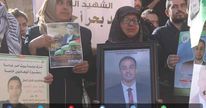
Dozens of Bethlehem University students and families of martyrs participated on Monday in a sit-in staged in the city to demand the Israeli authorities to release the detained bodies of martyrs.
According to a Palestinian Information Center (PIC) reporter, the participants carried pictures of martyrs as well as placards praising them and denouncing Israel’s policy of detaining bodies of slain Palestinians.
Speakers at the sit-in urged the Palestinian factions and all concerned parties to raise their voice loud against this Israeli arrogant policy and make efforts to enable the families of martyrs to receive the bodies of their relatives in order to bury them.
There are about 25 bodies of Palestinian male and female martyrs being held in Israeli morgues. All of them had been killed by either security or military forces during al-Quds intifada (uprising) that started in early October 2015.
According to a Palestinian Information Center (PIC) reporter, the participants carried pictures of martyrs as well as placards praising them and denouncing Israel’s policy of detaining bodies of slain Palestinians.
Speakers at the sit-in urged the Palestinian factions and all concerned parties to raise their voice loud against this Israeli arrogant policy and make efforts to enable the families of martyrs to receive the bodies of their relatives in order to bury them.
There are about 25 bodies of Palestinian male and female martyrs being held in Israeli morgues. All of them had been killed by either security or military forces during al-Quds intifada (uprising) that started in early October 2015.
28 nov 2016

Three student unions from universities in the southern occupied West Bank district of Bethlehem announced on Sunday that they would be “launching activities” in support of Palestinian families whose slain children's’ bodies are being held by Israel.
In a joint statement released Sunday, the student unions of Bethlehem University, Palestine Ahliya University, and al-Quds Open University - Bethlehem, slammed the Israeli government for holding the bodies of slain Palestinian alleged attackers” to punish their families and silence their voices.”
The government’s policy, the statement added, was a "type of war crime that the Israeli occupation adds to its criminal records."
The statement was released after representatives of the unions and represents of the Fatah youth movement met with families whose children's bodies are being held in Israel.
Israeli authorities dramatically escalated a policy of withholding Palestinian bodies killed by Israeli forces following the emergence of a wave of unrest across the occupied Palestinian territory and Israel in October 2015, having repeatedly claimed that funerals of Palestinians had provided grounds for “incitement” against the Israeli state.
However, following an uproar of protest among Palestinians over the policy, Israeli authorities began scaling down the practice, although a number of bodies still remain withheld.
When Israeli authorities have decided to return slain bodies and allow funerals in the occupied Palestinian territory, the ceremonies have been typically restricted by a long list of conditions imposed by Israeli authorities, including limiting the number of attendees and the deployment of Israeli soldiers throughout the event.
Palestinian families have also been forced to pay large financial deposits to the Israeli government as a collateral for potential “incitement” during the funerals and to ensure that families abide by Israeli-imposed conditions.
Israeli police announced in June that slain Palestinians from occupied East Jerusalem suspected of “terrorism” would no longer be able to have funerals in their neighborhoods or villages, but would instead be buried in cemeteries chosen by the Israeli police.
A joint statement released by Addameer and Israeli minority rights group Adalah in March condemned Israel’s practice of withholding bodies as "a severe violation of international humanitarian law as well as international human rights law, including violations of the right to dignity, freedom of religion, and the right to practice culture."
The statement said it appeared "many" of the Palestinians whose bodies Israel was holding had been "extrajudicially executed by Israeli forces during alleged attacks against Israelis, despite posing no danger."
In a joint statement released Sunday, the student unions of Bethlehem University, Palestine Ahliya University, and al-Quds Open University - Bethlehem, slammed the Israeli government for holding the bodies of slain Palestinian alleged attackers” to punish their families and silence their voices.”
The government’s policy, the statement added, was a "type of war crime that the Israeli occupation adds to its criminal records."
The statement was released after representatives of the unions and represents of the Fatah youth movement met with families whose children's bodies are being held in Israel.
Israeli authorities dramatically escalated a policy of withholding Palestinian bodies killed by Israeli forces following the emergence of a wave of unrest across the occupied Palestinian territory and Israel in October 2015, having repeatedly claimed that funerals of Palestinians had provided grounds for “incitement” against the Israeli state.
However, following an uproar of protest among Palestinians over the policy, Israeli authorities began scaling down the practice, although a number of bodies still remain withheld.
When Israeli authorities have decided to return slain bodies and allow funerals in the occupied Palestinian territory, the ceremonies have been typically restricted by a long list of conditions imposed by Israeli authorities, including limiting the number of attendees and the deployment of Israeli soldiers throughout the event.
Palestinian families have also been forced to pay large financial deposits to the Israeli government as a collateral for potential “incitement” during the funerals and to ensure that families abide by Israeli-imposed conditions.
Israeli police announced in June that slain Palestinians from occupied East Jerusalem suspected of “terrorism” would no longer be able to have funerals in their neighborhoods or villages, but would instead be buried in cemeteries chosen by the Israeli police.
A joint statement released by Addameer and Israeli minority rights group Adalah in March condemned Israel’s practice of withholding bodies as "a severe violation of international humanitarian law as well as international human rights law, including violations of the right to dignity, freedom of religion, and the right to practice culture."
The statement said it appeared "many" of the Palestinians whose bodies Israel was holding had been "extrajudicially executed by Israeli forces during alleged attacks against Israelis, despite posing no danger."
24 nov 2016
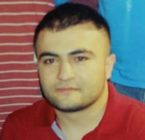
The Israeli occupation authorities (IOA) at dawn Thursday allowed only 15 family members to attend the funeral of the slain Palestinian youth Naseeb Umran Abu Meizar in Occupied Jerusalem.
Only 15 of Naseeb’s first-degree relatives marched in his funeral procession, amid tight Israeli security measures.
The IOA handed Naseeb’s body to his family at dawn Thursday after it had been withheld for a couple of months and slapped a fine of 20,000 shekels.
The casualty was buried in al-Mujahideen Cemetery, in Jerusalem’s neighborhood of Bab al-Sahira.
The Israeli occupation forces intensified their presence across Occupied Jerusalem and sealed off residential neighborhoods with military checkpoints to prevent an influx of angry protesters during the funeral procession.
Naseeb was shot dead by the occupation army last September at the Qalandiya military checkpoint, in northern Occupied Jerusalem, on claims of attempting to carry out an anti-occupation stabbing.
Only 15 of Naseeb’s first-degree relatives marched in his funeral procession, amid tight Israeli security measures.
The IOA handed Naseeb’s body to his family at dawn Thursday after it had been withheld for a couple of months and slapped a fine of 20,000 shekels.
The casualty was buried in al-Mujahideen Cemetery, in Jerusalem’s neighborhood of Bab al-Sahira.
The Israeli occupation forces intensified their presence across Occupied Jerusalem and sealed off residential neighborhoods with military checkpoints to prevent an influx of angry protesters during the funeral procession.
Naseeb was shot dead by the occupation army last September at the Qalandiya military checkpoint, in northern Occupied Jerusalem, on claims of attempting to carry out an anti-occupation stabbing.
18 nov 2016
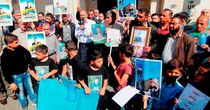
Hundreds of Palestinians marched after Friday prayer in Beit Ummar town, north of al-Khalil, demanding the immediate return of slain Palestinians’ bodies.
The participants chanted slogans in protest against the Israeli policy of withholding the corpses of 24 slain Palestinians for several months.
They also carried signs that read “No to collective punishment” and “We want our children.”
Approximately 24 slain Palestinians’ bodies are still held by Israeli government as part of its collective punishment policy against Palestinians.
Nearly 220 Palestinians have lost their lives at the hands of Israeli forces since the outbreak of Jerusalem Intifada in October 2015 when Israel imposed restrictions on the entry of Palestinian worshipers into the al-Aqsa Mosque compound.
The participants chanted slogans in protest against the Israeli policy of withholding the corpses of 24 slain Palestinians for several months.
They also carried signs that read “No to collective punishment” and “We want our children.”
Approximately 24 slain Palestinians’ bodies are still held by Israeli government as part of its collective punishment policy against Palestinians.
Nearly 220 Palestinians have lost their lives at the hands of Israeli forces since the outbreak of Jerusalem Intifada in October 2015 when Israel imposed restrictions on the entry of Palestinian worshipers into the al-Aqsa Mosque compound.
13 nov 2016
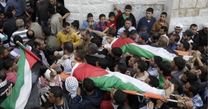
Dozens of Palestinians took to al-Khalil streets at noontime Sunday to call for releasing the bodies of their slain relatives withheld by the Israeli occupation authorities (IOA).
Speaking during the rally, Popular Front for the Liberation of Palestine (PFLP) leader Badran Jaber called for mobilizing popular and official campaigns to urge Israel to hand over the bodies of slain anti-occupation youths to their families.
Jaber appealed to the national and international human rights institutions to take immediate action and pressurize the Israeli occupation to return the bodies of slain protesters to their families so that they can bid them last farewell and bury them in Muslim cemeteries.
The rally-goers carried pictures of their slain children, whose bodies have been seized by the IOA, and raised the Palestinian flag. They further chanted slogans demanding the release of their children’s’ cadavers so that they can bury them at the soonest time possible.
Speaking during the rally, Popular Front for the Liberation of Palestine (PFLP) leader Badran Jaber called for mobilizing popular and official campaigns to urge Israel to hand over the bodies of slain anti-occupation youths to their families.
Jaber appealed to the national and international human rights institutions to take immediate action and pressurize the Israeli occupation to return the bodies of slain protesters to their families so that they can bid them last farewell and bury them in Muslim cemeteries.
The rally-goers carried pictures of their slain children, whose bodies have been seized by the IOA, and raised the Palestinian flag. They further chanted slogans demanding the release of their children’s’ cadavers so that they can bury them at the soonest time possible.
28 oct 2016
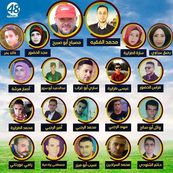
Dozens of Palestinians have staged on Friday a protest vigil in al-Khalil to the south of the occupied West Bank, calling for the return of the bodies of 21 protesters recently killed by Israeli gunfire.
Relatives of the slain Palestinians took to the streets in al-Khalil to denounce Israel’s refusal to hand over their sons’ bodies.
The protesters carried photos of 21 Palestinians, whose bodies are being held by Israeli authorities, demanding immediate and unconditional handover of their remains.
Since the outbreak of Jerusalem Intifada in October 2015, Israel decided not to return the bodies of slain Palestinians shot dead by Israeli forces to their families as part of its collective punishment policy.
Relatives of the slain Palestinians took to the streets in al-Khalil to denounce Israel’s refusal to hand over their sons’ bodies.
The protesters carried photos of 21 Palestinians, whose bodies are being held by Israeli authorities, demanding immediate and unconditional handover of their remains.
Since the outbreak of Jerusalem Intifada in October 2015, Israel decided not to return the bodies of slain Palestinians shot dead by Israeli forces to their families as part of its collective punishment policy.
3 oct 2016

Palestinian students marched in Qabatia town, south of Jenin, demanding an end to the Israeli detention policy of slain Palestinians’ bodies.
The march came as Israeli authorities continue to hold the body of Sari Abu Ghurab for 40 days since his shooting and killing by Israeli forces.
The protesters held Sari’s photos and banners calling for the return of his body. Sari was shot and killed by Israeli soldiers while driving near Yitzhar settlement only few days before his wedding.
The march came as Israeli authorities continue to hold the body of Sari Abu Ghurab for 40 days since his shooting and killing by Israeli forces.
The protesters held Sari’s photos and banners calling for the return of his body. Sari was shot and killed by Israeli soldiers while driving near Yitzhar settlement only few days before his wedding.
30 sept 2016
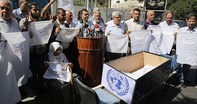
Palestinian families on Thursday organized a protest rally in al-Khalil city to demand the Israeli security authorities to release the bodies of their relatives.
According to Quds Press, dozens of families staged a sit-in near Ibn Rushd intersection in al-Khalil to protest the detention of 17 bodies belonging to their relatives for several months and to demand their release.
In speeches during the protest, relatives of martyrs and representatives of national institutions called on the Palestinian Authority to intervene for the release of those bodies.
The relatives condemned Israel's persistence in detaining the bodies of their sons and brothers and demolishing their homes as part of its mass punishment policy against the Palestinians.
According to Quds Press, dozens of families staged a sit-in near Ibn Rushd intersection in al-Khalil to protest the detention of 17 bodies belonging to their relatives for several months and to demand their release.
In speeches during the protest, relatives of martyrs and representatives of national institutions called on the Palestinian Authority to intervene for the release of those bodies.
The relatives condemned Israel's persistence in detaining the bodies of their sons and brothers and demolishing their homes as part of its mass punishment policy against the Palestinians.
